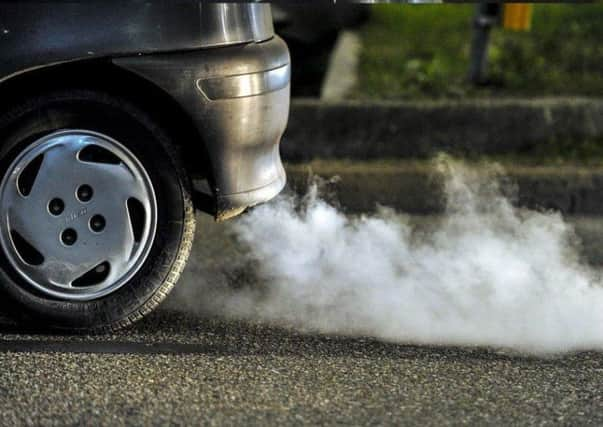Clean air plan '˜not enough' to tackle Yorkshire's high pollution rates


The Department for Environment, Food and Rural Affairs published the final version of the plan today, revealing a new focus on the country’s worst affected roads where it is suggested authorities could impose charges to cut down on harmful emissions.
The document also includes plans to bring forward the date by which councils will need to draw up their own strategy to curb pollution – as well as announcing additional funds to assist with their development.
Advertisement
Hide AdAdvertisement
Hide AdBut councillors and MPs have accused ministers of “passing the buck” onto under-pressure local authorities to deal with the issue, while failing to provide short-term solutions.
Wakefield MP and Environmental Audit committee chairman Mary Creagh expressed particular concerns about the lack of detail and ambition on areas like public transport and encouraging the switch to electric vehicles.
“This plan passes the buck to councils and lacks detail on how the Government will replace ancient diesel buses and trains now electrification has been scrapped,” she said.
“The Government has got no strategy for charging for electric vehicles and even if we did switch to electric cars in greater number the electricity grid is not set up to deal with the huge extra demand.
Advertisement
Hide AdAdvertisement
Hide Ad“We need more action on public transport and we need more action on electrification.
“There is nothing to help people suffering from the effects of air pollution today... it’s just not good enough.”
Air pollution – and in particular nitrogen dioxide (NO2) – is believed to contribute to around 40,000 deaths each year as well as being linked to heart disease, lung problems and dementia.
The Government has already lost two court cases over its failure to tackle excessive NO2 levels, and earlier this year was ordered to publish its new strategy to curb emissions by July 31.
Advertisement
Hide AdAdvertisement
Hide AdUnveiling the new plan yesterday, Environment Secretary Michael Gove described it as “one element” of a programme that would “deliver clean air for the whole country”. Transport Secretary Chris Grayling added that it marked a “green revolution” in transport that would “reduce pollution in our towns and cities”.
However, the strategy was criticised for failing to commit to a diesel scrappage scheme, instead promising a consultation later this year. Diesel vehicles are one of the biggest sources of nitrogen oxide emissions, and campaigners have long been pushing the government to reduce their numbers on UK roads.
The Government did, however, reaffirm its commitment to end the sale of all new conventional petrol and diesel cars by 2040. It also unveiled a £100m fund to help councils retrofit heavily polluting older busses, and roll out new vehicles.
One of the most controversial measures are proposals to allow local authorities to impose road charges in the worst-affected areas.
Advertisement
Hide AdAdvertisement
Hide AdThis has already been mooted in relation to the Clean Air Zones that are being drawn up for cities like Leeds, but the Government has now picked out specific roads where NO2 levels are set to exceed the legal limits, including stretches of the A58 and A643 in Leeds and the A57 in Sheffield.
Ministers have urged local authorities to avoid imposing fees where alternative measures would prove equally effective in reducing emissions. But it notes that in some areas, charging could bring pollution levels within legal limits as early as 2021.
The Government has pledged £255m to help councils implement plans to target these areas.
Commenting on the new clean air plan, councillor Jack Scott, Sheffield cabinet member for transport and sustainability, said he was “highly sceptical” the measures met the Government’s legal duty to cut pollution.
Advertisement
Hide AdAdvertisement
Hide Ad“Whilst I welcome any financial support that can help us to make faster improvements, particularly to improve our bus fleet, today’s announcements are especially disappointing,” he said.
“I am pleased the Government seem to be waking up to the scale of the problem, today’s announcement is entirely lacking in action, funding and leadership.”
Councillor Lucinda Yeadon, Leeds City Council’s executive board member for environment and sustainability said: “In Leeds we take the issue of air pollution very seriously and are already well on with modelling and research into a number of potential initiatives we could introduce in the city to improve air quality.
“We will of course be going out to consult with all relevant audiences before implementing a clean air solution for Leeds, and will be taking a paper to our executive board later this year with a number of recommendations for the next steps forward.”
Advertisement
Hide AdAdvertisement
Hide AdJames Thornton , chief executive of ClientEarth, the organisation that launched the legal challenge against the government last year, said: “A clear policy to move people towards cleaner vehicles by banning the sale of petrol and diesel cars and vans after 2040 is welcome, as is more funding for local authorities.
“However... the health issues caused by exposure to illegal air pollution are happening now, so we need urgent action to fix the problem now, including by tackling the existing dirtiest diesel vehicles, and helping people to move to cleaner alternatives well before 2040.”